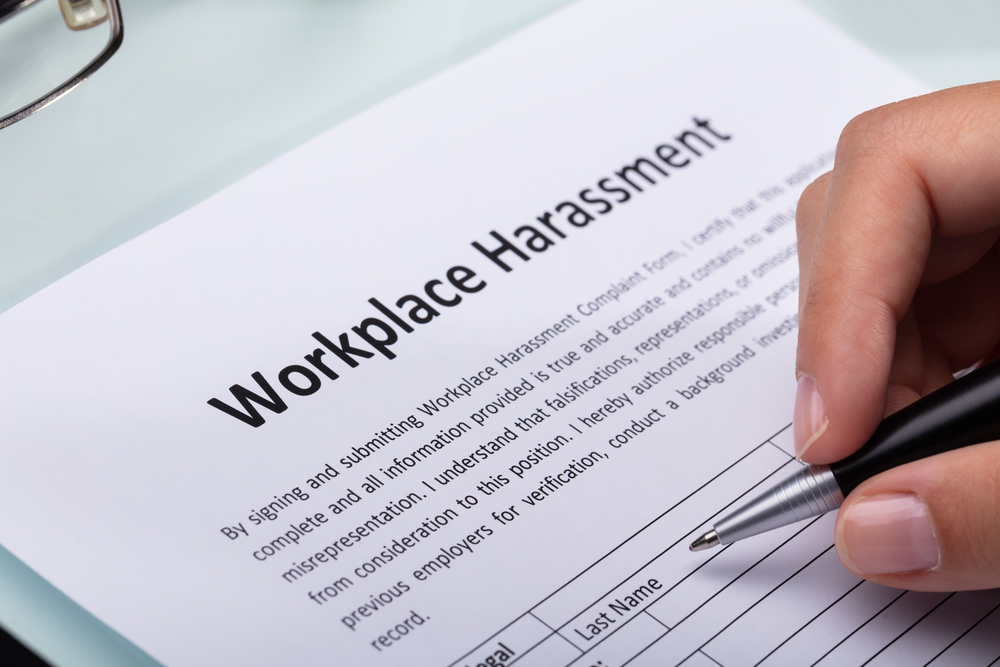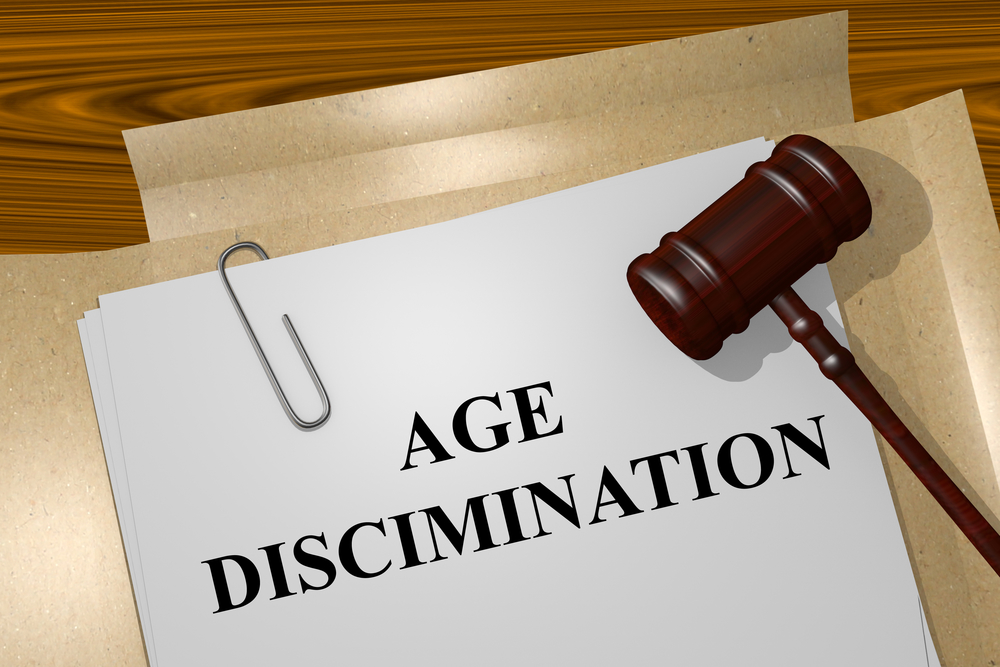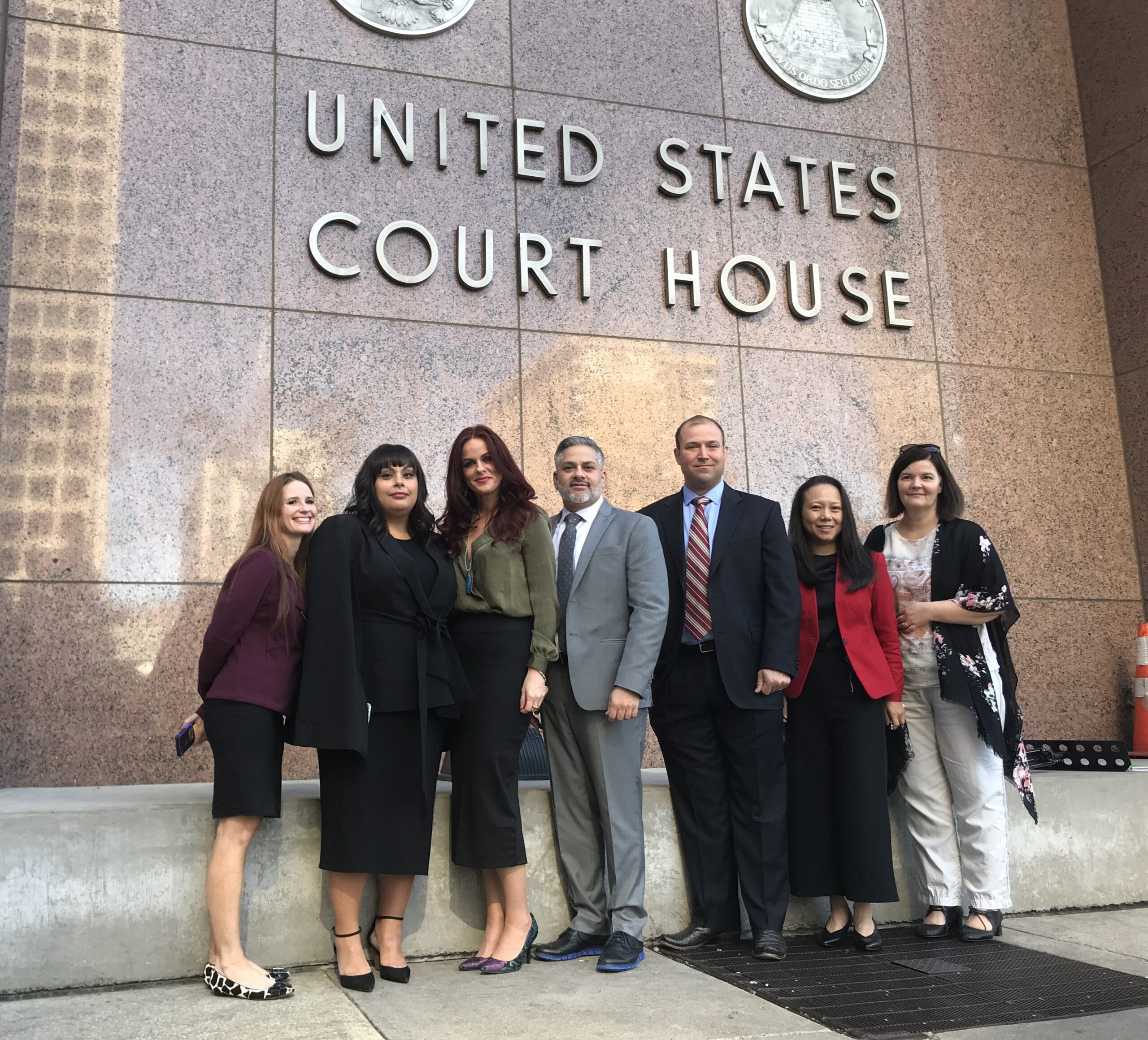 By Shaloni Pinto and Aimee Christianson
By Shaloni Pinto and Aimee Christianson
{Read in 4 minutes} With the passage of New York Senate Bill 7848A, the state will make it easier for workers to bring sexual harassment claims to court. Aimed to prevent sexual harassment in the workplace, the bill will amend the general business law to limit the coverage of mandatory arbitration clauses in relation to sexual harassment and will also amend the labor law to promote the prevention of sexual harassment.Continue reading
Babb v. Wilkie – The ADEA and Federal Employees Over Forty
 By Shaloni Pinto and Aimee Christianson
By Shaloni Pinto and Aimee Christianson
{Read in 4 minutes} Ms. Norris Babb alleges that her employer, the Department of Veterans Affairs, denied her advancement opportunities due to her age and gender, and retaliated against her after she filed complaints about the issue. If Ms. Babb was an employee in the private sector, she would have to test these allegations against the tried-and-true standards set by court precedent. Ms. Babb, however, is a federal employee, and the courts do not have a clear standard about how she can prove her age discrimination claim.
The federal-sector provision of the Age Discrimination in Employment Act of 1967 (ADEA), 29 U.S.C. §633a(a), states that any personnel actions which affect agency employees forty or older must be free from age discrimination. The “free from” wording within the law is unique to the provisions of the federal sector. The Court will answer whether a federal employee has to prove that an action was discriminatory but for her age.
Unlike public employers, private employers cannot make decisions “because of” an employee’s protected class. Both Congress and the courts have deliberated and set precedents on the standard a plaintiff must use to have a valid claim of employment discrimination. Employees in the private sector can either use the “but-for” standard or the motivating factor standard to confirm their allegations of employment discrimination. A motivating factor standard is lenient; it only requires the plaintiff to show that bias relating to their protected class influenced their employers.
Let’s examine Ms. Babb’s case to illustrate the difference between the “but-for” and “motivating factor” standard.
- If the Court holds that federal employees under the ADEA must use the “but-for” standard, then Ms. Babb will have to prove that she would have been promoted, if not for her age.
- Whereas if Ms. Babb used the motivating factor standard, she would have to prove that her age was a factor within a list of other factors that the employer used to deny her opportunities for advancement.
The “but-for” standard is stricter because Ms. Babb (as a plaintiff) must investigate the motivations of the employer and put forth an explanation that ties the other party’s decision-making to the age factor.
While the federal government has argued for the stricter “but-for” interpretation, Plaintiff Babb argues that the motivating factor standard should extend to federal employees. Now, the Court must decide whether federal employees have to abide by the stricter “but-for” standard or whether a motivating factor standard is permissible.
The circuit courts have given conflicting rulings on the issue. The DC Court of Appeals has held that the motivating factor is a valid standard for federal employees. Agencies like The Equal Employment Opportunity Commission (EEOC), charged to enforce the ADEA, have followed this precedent. Yet, other federal appeals courts like the Ninth and Eleventh Circuit have adhered to a stricter standard, holding that the “but-for” causation is the only way to allege age discrimination as a federal sector employee. Thus, this decision by the Supreme Court will resolve the conflicts among the circuit court of appeals and decide whether federal employees over forty need to adhere to a strict standard when alleging age discrimination.
Reference: Babb v. Wilkie, 2019 U.S. LEXIS 4444
Supervisor sues Omni hotels, alleging sexual harassment and retaliation when she reported it
North Dakota workplace discrimination trial set for 2019
A racial discrimination lawsuit brought by six workers on a North Dakota job site is set for trial in late 2019. Continue reading
FDNY sued for discrimination — again
Nearly three years after the city agreed to pay $98 million to settle claims of bias in its hiring of black and Hispanic firefighters, New York’s Bravest is being sued for discrimination again.
Continue reading
Let the Mother Beware: Pregnancy in the Workplace

It is somewhat hard to believe in this day and age that women experiencing pregnancy in the workplace are still being subjected to workplace policies that put their livelihood in jeopardy. Despite federal laws dating back to the Civil Rights Act of 1964 and several updates and addendums, there are still employers in the United States that have written policies that terminate workers due to pregnancy, regardless of the ability to perform that job’s duties and the overall physical capabilities of the workers.
A recent case in point was brought by the EEOC against a Baytown, Texas, restaurant chain called Bayou City Wings. Acting on behalf of a former employee named Maryann Castillo and eight other dismissed workers, the EEOC claimed that Bayou City Wings, and its parent company, JC Wings Enterprises, LLC, operated with a discriminatory policy against their workers who were experiencing pregnancy in the workplace. Their written policy mandated laying off workers after their third month of pregnancy, regardless of the employees’ desire and ability to stay on the job. In this case, Castillo was not experiencing any difficulties performing her job duties and had received approval from her doctor to work up to her 36th week of pregnancy.
Despite the honorable desire of the employer to take responsibility for the well-being of the unborn babies in these cases, it is important to note that the law and previous Supreme Court cases have determined that it is not the responsibility of employers to make decisions to protect the well-being of the unborn children of their employees, but rather the sole responsibility of the mothers involved. For employers, this could be a release of guilt if a mother’s decision to work jeopardizes her unborn child. The true benefit for this is that the women carrying their children should be able to have control over what they can or cannot do, without the arbitrary decisions of companies that are driven by the bottom line.
The EEOC cannot be the only protector of these cases of injustice and discrimination in the workplace. It is important for all employees, and especially women, to know their rights in a situation where they are facing a pregnancy in the workplace. Under the laws of this country, mothers-to-be are protected and have the law on their side. The Law offices of Valli, Kane, and Vagnini are specially equipped to help any victim of this or any other kind of discrimination in the workplace. Contact them for a free consultation to make sure that your rights are protected.
Will Obama End Employment Discrimination?
President Obama seems to hold the key which unlocked the door to his victory. What is the key to his success you ask? Simply addressing long lasting social issues. Close to two times as many women than men find concerns like same-sex marriage, abortion, and Employment Discrimination as the most important issues that determined their vote, based on recently reported polling information.
When it comes to discrimination in the workplace, Presidents over the years have issued orders to protect workers against it. In 1941 President Roosevelt issued an order that prevented discrimination against any worker because of their race, creed and national origin. The Civil Rights Act of 1964 was released two decades later, which outlaws employment discrimination based on religion, sex and race. Since Obama has been in office, he has addressed issues of employment discrimination and in 2011 he agreed to pass the Employment Non-Discrimination Act. He abolished “Don’t Ask, Don’t Tell” and openly supports the gay community and same sex marriage. That’s great for Obama, but what about the rest of the country? As it stands today, 21 states have outlawed sexual-orientation discrimination, while 16 also forbid gender-identity discrimination, and many cities and counties have similar nondiscrimination laws. But only about half of the population of the United States lives in places with such laws, which leaves millions of workers undefendable against discrimination.
Who is being Discriminated Against?
Nowadays, even though the world has widely accepted individuality and self expression, discrimination against women in the workplace still occurs. It is also distributed amongst lesbians, gays, bisexuals and transgendered people. A recent research study found that in the last five years, 27% of lesbian, gay or bisexual people had been harassed at work or lost a job because of their sexual orientation. In addition to that, half of transgender people had experienced discrimination in hiring, promotion or job retention. Discrimination can also be found in their paychecks. Studies also show that they earn less than heterosexual men with the same qualifications. Pay discrimination can also be found with women who, despite holding the same positions as men, are receiving less pay than men for doing the same job. Even though studies also show that there are more women attending colleges than men, women are still given less of a chance at flourishing financially in comparison to men in the workplace.
What Can Be Done?
There is currently a Democratic bill that has long been sitting in Congress, which Obama supports, called the Paycheck Fairness Act. The Paycheck Fairness Act would require employers to show that any salary differences between men and women doing the same job are not gender-related. The bill also would have prohibited employers from retaliating against employees who share salary information with their co-workers. The bill never passed because it could not gain the support of the Republican party.
South Florida Fire Department Under EEOC Investigation
Snug in Florida’s deep south, Davie, Florida is a town known for its Western roots, featuring a western-themed amusement park, and more citizens with horses than you can shake a stick at. Davie’s population of about 92,000 is supported by five fire stations, nos. 38, 65, 68, 91 and 104. The hundred year old town, once an out of the way western paradise, is now hitting the news as the subject of allegations of Title VII discrimination at its fire department.
A Host of Discrimination Complaints
The discrimination claims appear not to be an isolated incident: 18 Title VII claims in total are allegedly under investigation by the Equal Employment Opportunity Commission, or EEOC (the EEOC does not publicly discuss or confirm whether complaints are being investigated). Ten of the 18 charging parties are being represented by two attorneys. The most damning complaint comes from a female firefighter who claims she was unfairly subjected to full duty during the first trimester of her pregnancy. This charging party is alleging that eight (8) days after fighting a fire with her colleagues, she miscarried.
An Alleged Culture of Sexism and Bigotry
The charges center on complaints of sexism and bigotry. The most publicized involve the above case of miscarriage, as well as the story of Linda Stokoe. Stokoe was a fire inspector for the city, but was allegedly fired due to sex discrimination. The former inspector claims she was ordered to keep records of her bathroom visits, and that women were generally believed by her peers to be unfit for firefighting. Another charge alleges discrimination against a Jewish American, who claims derogatory terms and slurs were used against him.
How Does Title VII Apply?
Title VII, as amended, directly prohibits discrimination in the workplace on account of gender, race and religion, among other protected categories. The complaints described against the Davie, Florida Fire Department include racial and gender slurs, preferential treatment, and statements (direct, not implied statements) that women and some minorities are unfit to serve in the Fire Department. Since the Civil Rights Act of 1964 was instituted, nearly every generation of EEOC leadership interpreting the Act has prohibited such treatment.
Is This Your Story?
If you feel that your race, gender, religion, national origin, disability or age have played an unnecessary role at your job, or even in your attempts to find work, then you may have a claim of discrimination. For further information and a free consultation, call the law offices of Valli, Kane & Vagnini today.
Transgender Cases Now Included in Gender Discrimination Interpretation of Title VII
The Civil Rights Act of 1964 changed the landscape of human rights across the country. Title VII is the most hotly debated portion of that law in that it forbids discrimination based on five key metrics: race, color, religion, sex and national origin. In spite of the law’s nearly fifty years as a part of United States Code, it still requires active, repeated interpretation to ensure proper enforcement. The Equal Employment Opportunity Commission is responsible for making sure that act is enforced. Since Title VII’s inception, the EEOC has never ruled that transgender individuals are covered under the sexual discrimination cause of that Act—until April 2012.
Past EEOC Rulings Regarding Transgender Sexual Discrimination
Has discrimination on the basis of gender alignment always been a Title VII issue? Historically, it has not. In the past, when complaints were filed with the EEOC regarding discrimination against gay, lesbian, bisexual or transgender individuals, the complaint was handled as discrimination on the basis of sexual orientation. On three past occasions ranging from 1984 to 1986, the EEOC ruled that transgender discrimination did not constitute a Title VII claim. In April 2012, as the EEOC reviewed a complaint by Mia Macy against the Bureau of Alcohol, Tobacco, Firearms and Explosives, the EEOC ruled differently. As a result, transgender complaints are now considered under the purview of Title VII.
What is Gender Discrimination?
Gender discrimination under Title VII occurs when employment opportunities are denied or the terms and conditions of one’s employment are altered due to an individual’s gender. The interpretation of the law, previous to 2012, has excluded transgender individuals. The new interpretation of the law is important to the transgender community and for Title VII law. As an interpretation of an existing law, it may fundamentally modify the legal system’s understanding of gender.
When is Gender Discrimination Appropriate Under the Law?
Are there situations where gender discrimination is deemed legally appropriate? Yes, there are. Gender preferences are permissible when an employer takes an affirmative action hiring policy to rectify past discrimination. In addition, there are narrow cases where gender discrimination is inherent to the working conditions, i.e. male or female modeling, etc.
A Time of Change in Transgender Rights
With this important EEOC ruling regarding transgender discrimination under Title VII, the American legal understanding of transgender rights is in flux. If you would like to find out more about the rights and actions surrounding an act of transgender discrimination, contact Valli, Kane & Vagnini for a free consultation.
Illegal Employment Interview Questions

We are in an economy where jobs are at a premium. There are too many people competing for too few jobs. This puts the employers in the driver’s seat. But whether you are on the West Coast or in New York, employment attorneys will tell you that this does not give the employers carte blanche in the way they treat job candidates. There are laws that apply to the hiring process. These laws range from conduct of the interviewer to the basis of the decision to hire; from questions that an interviewer cannot ask to what can be considered in a hiring decision.
How Can Job Interview Questions be Illegal?

Employers have broad latitude when it comes to the question they can ask a candidate during a job interview. However, starting in the 1960s, a series of federal employment laws have protected certain types of information. These laws shut down questions along the lines of race, religious beliefs, health, age, sexual orientation and marital status. In addition to federal law, New York State and local anti-discrimination laws lend additional protections to job candidates.
As objective as the law may try to be, New York employment attorneys will tell you that the law is far from perfect. Though an employer may not discriminate based on the color of your skin, they can discriminate based on the color of something like your tie or shoes. The employer cannot choose to hire or reject you on account of something like your religious beliefs, but they base their decision on your personality and disposition during the interview or even where you may have worked in the past. In other words, an employer can discriminate as long as they do not discriminate in an area where the law designates specific protections.
If You Have Been Discriminated Against, What Are Your Options?
So what do you do if you are asked legally out-of-bounds questions like – What is your age? Are you a Christian (Jew, Muslim, etc.) Are you planning to start a family? Are you disabled? One of your options is to tactfully point out to the interviewer that the question was illegal. Once the interviewer is alerted, assume that the ball is in the employer’s court. However, New York employment lawyers say that it is probably a good thing to know right up front that the company is not up to speed on employment issues or, worse yet, intentionally breaking the law. It is certainly an indication that something worse may be around the corner if you do get hired!
Another option is to go ahead and answer the illegal question. You can answer it honestly, if you believe it will not harm you in any way. A final option is to give a misleading answer if the question is clearly illegal. The employer can hardly justify condemning you for lying in response to a question that violates your civil rights. No matter what you decide to do, make sure you take not of what transpires and if you feel you were not hired on account of your response, or lack thereof, you may have a claim against them for discrimination.
Finally, you may find your best option is to contact New York employment attorneys, Valli Kane & Vagnini, LLP, for a free consultation to determine if you have been discriminated against and what your legal rights are.





